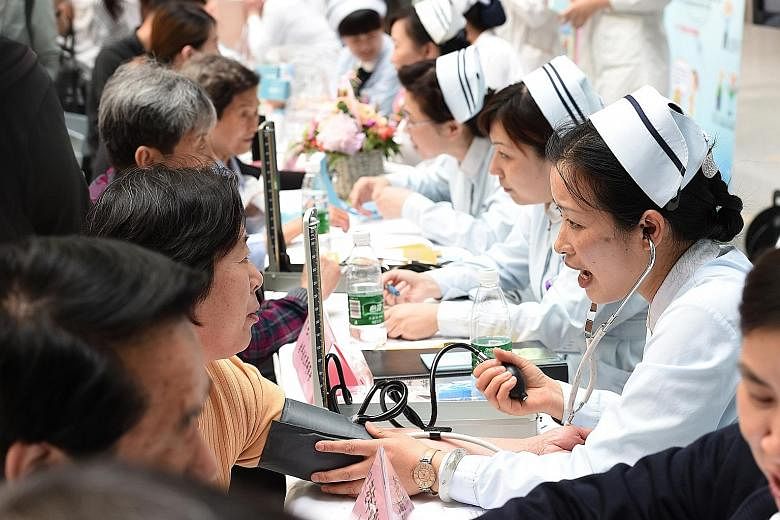BEIJING • China's health authorities are planning to establish a nationwide family doctor system whereby every Chinese family is connected to one doctor.
The move, reported China Daily yesterday, came after the death of a 21-year-old student who underwent an experimental cancer treatment he found on search engine Baidu.
Before his death, Mr Wei Zexi accused the military-run hospital that provided the treatment of making false claims about its effectiveness. He also slammed Baidu for promoting false medical information.
Mr Wei's death made headlines around the world and exposed Baidu's reliance on paid listings, which rank search results according to how much the advertisers have paid, and the low levels of supervision in some military hospitals.
But at the crux of the medical scandal is China's overstretched healthcare system where the distribution of resources is unbalanced. The public also has limited access to information related to health and medicine.
-
PHYSICIANS PER 1,000 PEOPLE IN 2010
1.4 - In China
2.4 - In the United States
"So the Internet, specifically the nation's search giant Baidu, has become the most popular accessible resource," said Professor Liu Yuanli, dean of the School of Public Health at Peking Union Medical College. "A family doctor system would help prevent tragedies like Wei's in the future."
The State Council, or China's Cabinet, has ordered greater efforts to improve public access to family doctors and to set up a general practitioner (GP) system by improving career prospects for these doctors and diverting more resources to the grassroots.
Ms Li Bin, director of the National Health and Family Planning Commission, has said that her top priority for the next five years would be to establish a system under which every family will be registered with a general practitioner.
"It will help to establish a well-organised and orderly healthcare system to better ensure public health," she said last month.
Prof Liu explained that family doctors can serve as the first line of gatekeepers for primary health care and, if needed, refer patients to qualified specialists.
Going to see a doctor has long posed problems for Chinese people.
With the country's large population and a shortage of medical staff, hospitals are always swarming with patients - and scalpers - leading to long waiting times and strained doctor-patient relations.
Dr Du Xueping, head of the Chinese Medical Doctor Asso- ciation's general practice committee, said the lack of a general practitioner or GP system means people swarm to large public hospitals, even for minor ailments such as common colds.
State insurance coverage is limited in China, meaning patients often have to pay a large part of healthcare costs themselves, especially those with major long-term diseases such as cancer or diabetes.
Pilot programmes have been introduced in several provinces and regions to ease the pressure on big hospitals, reported Xinhua news agency. In Xi'an city in Shaanxi province, for instance, more than 2.5 million local residents have signed up with family doctors.
Prof Liu also called for the establishment of a dedicated search engine to provide credible healthcare information to help people make informed choices.
The system could resemble NHS Choices, the official website of the National Health Service in Britain.
Launched in 2007, NHS Choices is Britain's biggest medical website, accounting for about 25 per cent of all health-related Web traffic, such as searches for information about symptoms, illnesses and the most up-to-date treatments, according to Prof Liu.
On Sunday, Sougou, one of Baidu's biggest rivals, launched a new search product called Wise Doctor.
The company said the site is free from commercial influence and major sources of information include the World Health Organisation and the Chinese Centre for Disease Control and Prevention.

